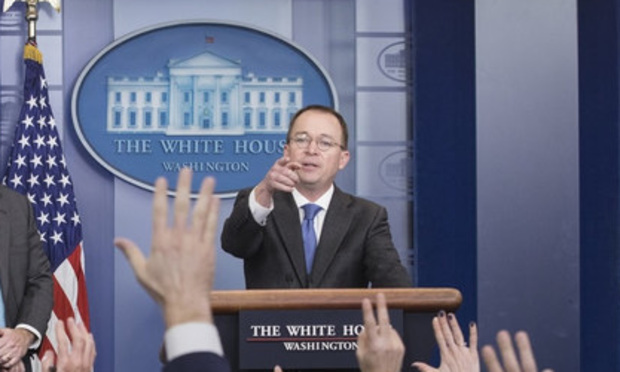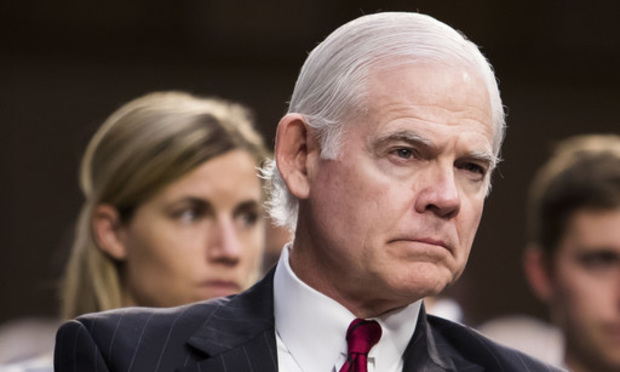Mulvaney, Falling in Line With Trump, Drops Plan to Sue Over House Subpoena
"After further consideration, Mr. Mulvaney does not intend to pursue litigation regarding the deposition subpoena issued to him by the U.S. House of Representatives," Mulvaney's lawyer, William Pittard, said in a court filing Tuesday.
November 12, 2019 at 10:54 AM
4 minute read
 Acting White House chief of staff Mick Mulvaney. Credit: White House
Acting White House chief of staff Mick Mulvaney. Credit: White House
Mick Mulvaney on Tuesday said he would defy a U.S. congressional subpoena seeking his testimony as part of the impeachment inquiry, abruptly dropping plans to file a lawsuit to confront whether House Democrats could force him to sit for questioning.
The about-face came a day after Mulvaney's lawyer, William Pittard of Washington's KaiserDillon, told a Washington federal trial judge that the acting White House chief of staff would file his own suit confronting the power of House Democrats to compel top Trump officials to testify.
Mulvaney had previously pressed to join a lawsuit filed by former National Security Adviser John Bolton's deputy, Charles Kupperman, who went to court seeking clarity on whether he could comply with a congressional subpoena or follow the White House's instructions to not cooperate with the impeachment inquiry.
"After further consideration, Mr. Mulvaney does not intend to pursue litigation regarding the deposition subpoena issued to him by the U.S. House of Representatives," Pittard said in a court filing Tuesday. "Rather, he will rely on the direction of the President, as supported by an opinion of the Office of Legal Counsel of the U.S. Department of Justice, in not appearing for the relevant deposition."
During a telephone conference on Monday, the judge overseeing Kupperman's case expressed reluctance to allow Mulvaney to join Kupperman's lawsuit. Kupperman's lawyer, Charles Cooper of Cooper & Kirk in Washington, resisted Mulvaney's bid to join the lawsuit, saying the acting White House chief of staff had "made it clear in his papers and in public statements by his counsel that he's entirely aligned with the president."
Kupperman, on the other hand, "takes no position on the merits of the issue," Cooper said in the Monday evening telephone conference, according to a transcript of the call.
"He is, and will remain, neutral throughout these proceedings," Cooper said. "So not only will we not adequately represent the interests of Mr. Mulvaney, we won't represent them at all."
 Charles Cooper, of Cooper & Kirk, and Attorney General Jeff Sessions's attorney, during Sessions's testimony before the Senate Intelligence Committee, on June 13, 2017.
Charles Cooper, of Cooper & Kirk, and Attorney General Jeff Sessions's attorney, during Sessions's testimony before the Senate Intelligence Committee, on June 13, 2017.U.S. District Judge Richard Leon said on the call that he was "not inclined" to grant Mulvaney's request to join Kupperman's case as an intervenor. Leon scheduled a hearing for Tuesday afternoon to address whether Kupperman would object to letting Mulvaney's would-be lawsuit be considered a "related" case. With that designation, Mulvaney's case would be handed directly to Leon, bypassing the court's random assignment process.
In his court filing Tuesday, Pittard said "Mulvaney respectfully suggests that there no longer is a need" for that hearing. Leon, noting Mulvaney's plans, scrapped the hearing.
The Washington Post reported Monday that Mulvaney's efforts to join Kupperman's suit "baffled several administration officials." The White House reportedly had insisted that Mulvaney's litigation plans were not adverse to the interests of the president. Still, the Post report described internal discord at the White House, with Mulvaney and Pat Cipollone, the White House counsel, at times at odds with each other.
House investigators are looking at how and why President Donald Trump tried to pressure Ukrainian officials to investigate Trump's political rivals, including Joe Biden, a leading Democratic contender in the 2020 presidential race. Trump has denied that he engaged in improper conduct, describing as "perfect" a closely scrutinized call in which he appeared to pressure his Ukrainian counterpart to mount an investigation into a domestic political rival.
Mulvaney last month appeared to acknowledge an explicit quid pro quo, but he later walked back those remarks, which were televised. Mulvaney's press statement, according to the Post and other media outlets, complicated the White House positioning that Trump had not used the power of the presidency to urge a foreign power to meddle in U.S. elections.
Read more:
Mick Mulvaney Plans His Own Bid Confronting Impeachment Testimony
House Attorneys Prepare to Go Public in Impeachment Hearings
'Let's Motor Through, Chairman': How Robert Luskin Guided Gordon Sondland
'Barely-Lawyered Temper Tantrum': What Lawyers Said About Cipollone's Letter
16 Conservative Lawyers Say They Support 'Expeditious' Impeachment Inquiry
This content has been archived. It is available through our partners, LexisNexis® and Bloomberg Law.
To view this content, please continue to their sites.
Not a Lexis Subscriber?
Subscribe Now
Not a Bloomberg Law Subscriber?
Subscribe Now
NOT FOR REPRINT
© 2025 ALM Global, LLC, All Rights Reserved. Request academic re-use from www.copyright.com. All other uses, submit a request to [email protected]. For more information visit Asset & Logo Licensing.
You Might Like
View All
'Where Were the Lawyers?' Judge Blocks Trump's Birthright Citizenship Order
3 minute read
Supreme Court Considers Reviving Lawsuit Over Fatal Traffic Stop Shooting

Hours After Trump Takes Office, Democratic AGs Target Birthright Citizenship Order
4 minute read
Supreme Court Will Hear Religious Parents' Bid to Opt Out of LGBTQ-Themed School Books
Trending Stories
- 15th Circuit Considers Challenge to Louisiana's Ten Commandments Law
- 2Crocs Accused of Padding Revenue With Channel-Stuffing HEYDUDE Shoes
- 3E-discovery Practitioners Are Racing to Adapt to Social Media’s Evolving Landscape
- 4The Law Firm Disrupted: For Office Policies, Big Law Has Its Ear to the Market, Not to Trump
- 5FTC Finalizes Child Online Privacy Rule Updates, But Ferguson Eyes Further Changes
Who Got The Work
J. Brugh Lower of Gibbons has entered an appearance for industrial equipment supplier Devco Corporation in a pending trademark infringement lawsuit. The suit, accusing the defendant of selling knock-off Graco products, was filed Dec. 18 in New Jersey District Court by Rivkin Radler on behalf of Graco Inc. and Graco Minnesota. The case, assigned to U.S. District Judge Zahid N. Quraishi, is 3:24-cv-11294, Graco Inc. et al v. Devco Corporation.
Who Got The Work
Rebecca Maller-Stein and Kent A. Yalowitz of Arnold & Porter Kaye Scholer have entered their appearances for Hanaco Venture Capital and its executives, Lior Prosor and David Frankel, in a pending securities lawsuit. The action, filed on Dec. 24 in New York Southern District Court by Zell, Aron & Co. on behalf of Goldeneye Advisors, accuses the defendants of negligently and fraudulently managing the plaintiff's $1 million investment. The case, assigned to U.S. District Judge Vernon S. Broderick, is 1:24-cv-09918, Goldeneye Advisors, LLC v. Hanaco Venture Capital, Ltd. et al.
Who Got The Work
Attorneys from A&O Shearman has stepped in as defense counsel for Toronto-Dominion Bank and other defendants in a pending securities class action. The suit, filed Dec. 11 in New York Southern District Court by Bleichmar Fonti & Auld, accuses the defendants of concealing the bank's 'pervasive' deficiencies in regards to its compliance with the Bank Secrecy Act and the quality of its anti-money laundering controls. The case, assigned to U.S. District Judge Arun Subramanian, is 1:24-cv-09445, Gonzalez v. The Toronto-Dominion Bank et al.
Who Got The Work
Crown Castle International, a Pennsylvania company providing shared communications infrastructure, has turned to Luke D. Wolf of Gordon Rees Scully Mansukhani to fend off a pending breach-of-contract lawsuit. The court action, filed Nov. 25 in Michigan Eastern District Court by Hooper Hathaway PC on behalf of The Town Residences LLC, accuses Crown Castle of failing to transfer approximately $30,000 in utility payments from T-Mobile in breach of a roof-top lease and assignment agreement. The case, assigned to U.S. District Judge Susan K. Declercq, is 2:24-cv-13131, The Town Residences LLC v. T-Mobile US, Inc. et al.
Who Got The Work
Wilfred P. Coronato and Daniel M. Schwartz of McCarter & English have stepped in as defense counsel to Electrolux Home Products Inc. in a pending product liability lawsuit. The court action, filed Nov. 26 in New York Eastern District Court by Poulos Lopiccolo PC and Nagel Rice LLP on behalf of David Stern, alleges that the defendant's refrigerators’ drawers and shelving repeatedly break and fall apart within months after purchase. The case, assigned to U.S. District Judge Joan M. Azrack, is 2:24-cv-08204, Stern v. Electrolux Home Products, Inc.
Featured Firms
Law Offices of Gary Martin Hays & Associates, P.C.
(470) 294-1674
Law Offices of Mark E. Salomone
(857) 444-6468
Smith & Hassler
(713) 739-1250










